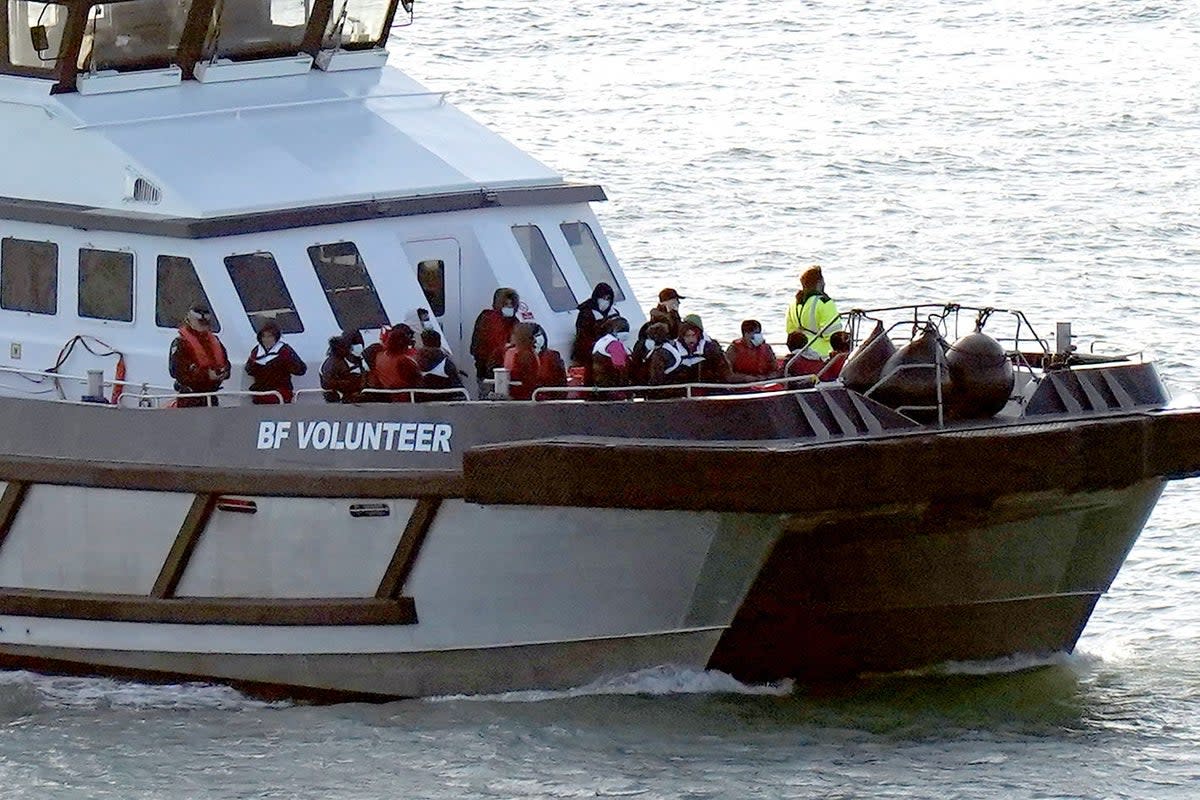Government stalls Priti Patel’s asylum seeker reception centres plan despite hotel chaos

- Oops!Something went wrong.Please try again later.
- Oops!Something went wrong.Please try again later.
The government is yet to begin construction of promised reception centres that were planned to house up to 8,000 migrants, despite a worsening accommodation crisis.
The plan was announced to fanfare more than a year ago, promising “swift delivery”, but no new facilities have been set up and almost 50,000 asylum seekers and refugees are now being housed in hotels at a cost of £6.8m a day.
Former home secretary Priti Patel raised the matter of the delay in a written parliamentary question this week, asking her successor Suella Braverman “what progress she has made on the introduction of asylum reception centres”.
In a brief response, the immigration minister Robert Jenrick said the government “continued to develop proposals” but gave no further detail.
The Independent understands that a list of potential sites for reception centres across the country was drawn up under Boris Johnson’s government, but that the Treasury – then headed by Rishi Sunak – did not approve the funding requested by the Home Office.
Officials denied that the wider programme had been shelved, but could not point to any work currently being undertaken.
It is understood that several of the sites originally proposed by the Home Office are in Conservative constituencies, and that strong opposition was expected from both local residents and MPs.
During his Conservative Party leadership campaign, Mr Sunak pledged to axe advanced plans to convert a former RAF base in the Yorkshire village of Linton-on-Ouse into accommodation for 1,500 asylum seekers.
The facilities were a key part of the New Plan for Immigration, which stated: “To help speed up processing of claims and the removal of people who do not have a legitimate need to claim asylum in the UK, we plan to introduce new asylum reception centres to provide basic accommodation and process claims.” It added that “the use of hotels to accommodate new arrivals who have entered the UK illegally will end”.
A policy document said that the centres were intended to assist in the deportation of asylum seekers to safe countries they had passed through on the way to Britain, and would provide support, including healthcare and education.
In August 2021, the government issued a call for contractors to design, build and operate the reception centres. A document said they would deliver accommodation for up to 8,000 people, and that contractors would have to “deliver a swift programme of delivery to reduce capacity issues in the asylum estate”.
The Home Office insists it has not shelved the work, but there has been no public update since the advertisement closed on 30 September last year.
Concerns were raised about the scheme in response to an official consultation, with the Greater London Authority asking how local public services would cope and warning of the potential for “wellbeing, safeguarding and safety impacts upon people in reception centres”.
The Refugee Council said the proposals would do “nothing to address the current backlog of people awaiting an initial decision for more than six months, which is currently at a record high”.
More than 40,000 migrants – a record number – have crossed the English Channel in small boats so far in 2022, but while nine out of 10 claim asylum, only 2 per cent have had their claims decided.
The Home Office has a legal duty not to leave asylum seekers destitute while they await a decision, and the backlog is driving chaotic attempts to find hotel places because of a lack of proper accommodation.
Hotel places are in increasingly short supply, and insufficient provision caused thousands of migrants to be held for allegedly unlawful periods at the Manston processing centre in October.
In November, a man who had been detained at the site died after contracting diphtheria, weeks after the UK was warned about the spread of the illness and urged to vaccinate migrants in crowded reception centres.
Legal action is under way on behalf of several people detained at Manston. The number being held at the site has now been reduced to within the intended capacity of 1,600. Asylum seekers can be kept there for a maximum of 24 hours.
Last month, Mr Jenrick told parliament that thousands of hotel places had been used to move people out of Manston and “ensure it is operating legally and correctly”.
In internal documents revealed in a report by the Independent Chief Inspector of Borders and Immigration, the Home Office has admitted that housing unaccompanied child asylum seekers in hotels is illegal.
An entry on an internal “risk register” from August 2021 said: “Senior civil service confirmed we are running children’s homes and committing a criminal offence, but relying on the defence of necessity. The mitigation is to stop doing this ... advice is going to ministers.”
A report published in October by the immigration watchdog said it had “found limited evidence of progress on a concrete exit strategy from the use of hotels”.

